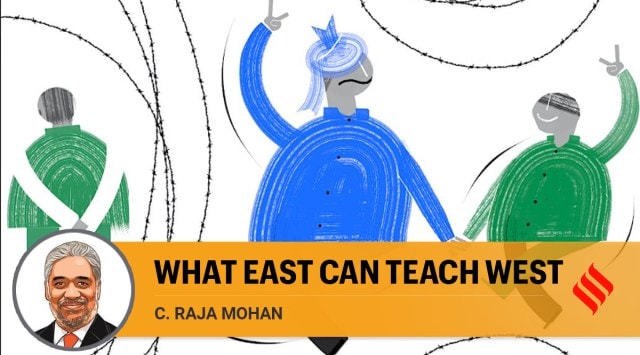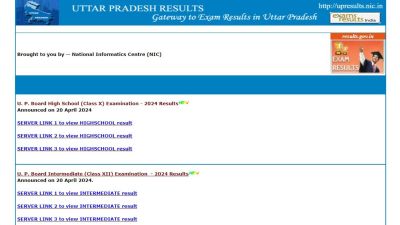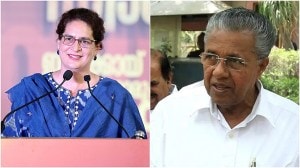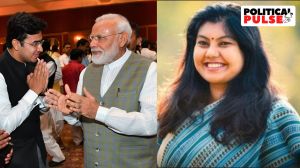- India
- International
C Raja Mohan writes | India, Bangladesh, Pakistan: What east can teach west
C Raja Mohan writes: Good news from India's eastern frontier with Bangladesh raises a hope: If we can do it in the east, where the sources and consequences of Partition were far more complex, it should not be impossible to normalise the western frontier with Pakistan
 In contrast to the talk of a 100-year war between India and Pakistan, Bangladesh PM Sheikh Hasina and Narendra Modi have proclaimed a “sonali adhyay” or “golden chapter” in bilateral relations. (AP Photo/File)
In contrast to the talk of a 100-year war between India and Pakistan, Bangladesh PM Sheikh Hasina and Narendra Modi have proclaimed a “sonali adhyay” or “golden chapter” in bilateral relations. (AP Photo/File)The news from India’s western frontier with Pakistan is rarely positive. There is little expectation of change as we celebrate the 75th anniversary of Independence and mark the partition of the Subcontinent. The persistence of cross-border terrorism, the conflict over Kashmir, the militarisation of the frontier, little connectivity, poor trade relations and no formal inter-governmental negotiations paint a bleak picture of the India-Pak border.
The inability of successive generations of Indian and Pakistani leaders to bring a closure to Partition in the west makes the talk of a “100-year war” credible. The only trend that can counter this pessimism is the good news from India’s eastern frontier with Bangladesh — that it is indeed possible to transcend the bitter legacies of Partition and build a mutually-beneficial relationship.
If we can do it in the east, where the sources and consequences of Partition were far more complex, it should not be impossible to normalise the western frontier — hopefully well before 2047. In contrast to the talk of a 100-year war between India and Pakistan, Prime Ministers Sheikh Hasina and Narendra Modi have proclaimed a “sonali adhyay” or “golden chapter” in bilateral relations.
Cynics would discount that rhetoric; pessimists continue to see the cup as half empty. But there is no question that the bilateral relationship dominated by endless contentions at the turn of the millennium has transformed into a very productive partnership. For both Delhi and Dhaka, the reinvention of the bilateral relationship has been one of the most significant successes of their recent foreign policies.
The work on rebuilding ties began in earnest in 2010, when Sheikh Hasina came to India after taking charge of Bangladesh as prime minister for the second time in 2009. Hasina and Prime Minister Manmohan Singh embarked on an extraordinary effort to address most bilateral problems—including border settlement, river water sharing, cross-border terrorism, market access to Bangladeshi goods, and connectivity.

With impressive progress in many of these areas, Singh travelled to Dhaka in September 2011; but West Bengal chief Mamata Banerjee rained on the parade by refusing to join the delegation at the last minute and pulling the plug on the agreement to share the Teesta waters. The visit was salvaged by other agreements, including the settlement of the land boundary that had been pending for decades.
But the Manmohan Singh government struggled to get Parliament to approve the boundary settlement. Part of the problem was the rejection of the settlement by the main opposition party — the BJP. Recognising the strategic significance of a settled boundary with Bangladesh, Modi reversed the position of the BJP after he became the PM in 2014. He won support for the shift from the BJP units in Bengal and Assam, and got parliamentary approval in 2015.
Modi also accepted the award of the Permanent Court of Arbitration in The Hague on settling the maritime boundary dispute between Delhi and Dhaka. Bangladesh had taken the issue to international arbitration. In normal circumstances, the bureaucrats in the two capitals would have argued for another couple of decades without settling the dispute. But Delhi moved decisively to accept the verdict and removed another long-standing territorial dispute in bilateral relations.
While the unresolved land and maritime territorial disputes constitute one of the main problems in India’s relations with Pakistan, their resolution with Bangladesh transformed the context of bilateral relations.
Cooperation on cross-border terrorism that began a couple of years earlier helped build much-needed political trust between the two national security establishments. The incremental opening of the Indian market for Bangladeshi goods and Dhaka’s willingness to let Indian goods transit to India’s northeast boosted bilateral relations.
The last few years have seen bilateral ties grow rapidly. On the connectivity front, we have seen a substantive movement towards reopening the border that was largely shut down after the 1965 war between India and Pakistan. Trans-boundary bus services, reopening of railway lines, and the revitalisation of waterways are restoring connectivity in the eastern subcontinent that was severed.
Bilateral trade volumes have grown by leaps and bounds in recent years touching nearly $16 billion last year. Bangladesh is one of India’s top export markets. Meanwhile, Bangladesh has become one of the fastest-growing economies in the world and has overtaken Pakistan by a good margin in South Asia. India and Bangladesh have also developed inter-connected power grids facilitating Dhaka’s purchase of power from India. It currently buys about 1200 MW of power from India and an additional 1500 MW is in the pipeline.
The progress on the India-Bangla front could have been more expansive if the governments of West Bengal were enthusiastic about regionalism in the eastern Subcontinent. Neither the Left parties nor the Trinamool Congress that have ruled West Bengal for so long have had a transformative agenda for regional cooperation in the eastern subcontinent.
Today the northeastern states have realised the immense benefits of deeper economic engagement with Bangladesh — none of them more important than ending the geographic isolation of the region. Assam today is at the forefront of imagining a bolder agenda for deepening economic ties with Bangladesh.
For India, the expansive partnership with Bangladesh has significantly eased its security challenges and laid the basis for peace and prosperity in the eastern subcontinent. For Bangladesh, discarding the temptation to balance India and embark on a cooperative strategy has allowed Dhaka to focus on its economic growth and lift itself in the regional and global hierarchy.
There were efforts by India to replicate these kinds of moves with Pakistan; but Islamabad and Rawalpindi have not been ready to accept even the simplest of initiatives on trade, connectivity, or trans-border energy cooperation. India has had no choice but to live with the sovereign choices of the Pakistani leadership.
Rather than regret the unfortunate dynamic on the western frontier and bemoan Pakistan’s reluctance to let the SAARC become a vehicle for regional cooperation, Delhi should focus on consolidating the “golden moment” in the east. There is no shortage of issues in the east that need to be addressed by Delhi and Dhaka. They include protecting the rights of minorities, sharing the waters of more than 50 rivers, promoting cross-border investments, managing one of the longest borders in the world, facilitating trade and preventing illegal migration, countering forces of religious extremism, promoting maritime security in the Bay of Bengal, expanding defence cooperation, and mitigating climate change in the shared regional environment to name a few.
Many of these issues are alive and continuously threaten to destabilise the growing strategic partnership. Solving problems and tending to the relationship must necessarily be a continuous effort rather than episodic. Nor can Delhi and Dhaka take each other for granted and let domestic politics overwhelm the logic of bilateral cooperation. The 75th anniversary of independence offers Delhi and Dhaka a special opportunity to elevate the ambition for their bilateral partnership.
The writer is senior fellow, Asia Society Policy Institute in Delhi and a contributing editor on international affairs for The Indian Express
EXPRESS OPINION
Must Read
More Explained
Apr 20: Latest News
- 01
- 02
- 03
- 04
- 05










































